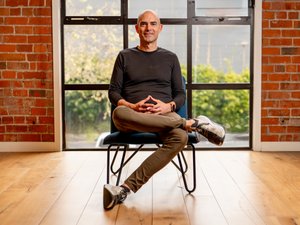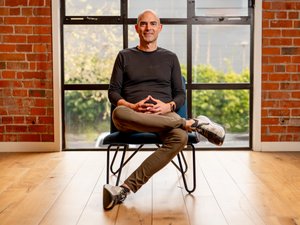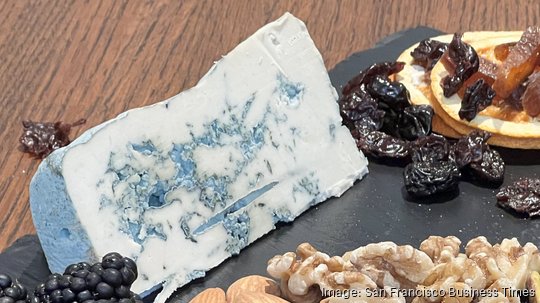
Stephen Colbert plucked up a toothpick that had been prepped with a triangular block of blue cheese and examined the moldy swirls before popping it in his mouth.
Nine seconds later he said, "I like it. You can really taste the foot."
Colbert had just tasted a vegan blue cheese produced by a Berkeley-based startup called Climax Foods.
How did a Bay Area startup with $27 million in funding land a two-minute-long segment, and its product, on "The Late Show with Stephen Colbert" in May — the kind of publicity most startups would die for?
A few days earlier, news had broken that Climax had been disqualified from the Good Food Awards, an annual tasting contest organized by a San Francisco nonprofit, the Good Food Foundation
The foundation's executive director, Sarah Weiner, hadn't publicly disclosed an exact reason for the disqualification and a brief media storm ensued over the vegan cheese that beat dairy.
"Really? Really? You couldn't just let vegans have this one thing?" Colbert joked on the "Late Show." "They have no friends, they have no food."
Was someone in the traditional dairy industry out to squash its vegan competition? No.
Instead, what unfolded was what appears to be a classic case of startup hubris — an upstart believing it didn't have to play by traditional gatekeepers' rules, and finding out just how important pleasing them can be.
Fakin’ casein
Cheese is big business — it’s expected to exceed $45 billion in sales just in the U.S. by 2027, according to a report from Allied Market Research — but it’s also a fundamentally different industry than software. With an app, you can often fake it until you make it.
Fakery in food is taken much more seriously by regulators, retailers, consumers and tastemakers. Food manufacturing is heavily regulated, and ingredients, even when perfectly legal, are closely scrutinized.
One of Climax's selling points has been its use of artificial intelligence. But it also relies heavily on traditional food science, as well, and has set out to mimic the flavors, textures and gooey pull of traditional dairy products while using non-animal-derived ingredients.
“We want to demonstrate that there is an alternative to dairy that is very viable, that doesn’t sacrifice in terms of taste and is nutritionally superior and cheaper to produce. And we’re going to prove that with the cheese and probably some other products,” Climax Foods founder and CEO Oliver Zahn told the San Francisco Business Times earlier this year.
The market for so-called plant-based or vegan cheese alternatives is also growing.
Vegan cheese alternatives reached $2.75 billion in sales in 2022, and the market is expected to more than double to over $7 billion by 2030, according to a report from Grand View Research.
Climax is competing for a bite of that market.
Vegan food brands based in the Bay Area include Miyoko's Creamery and Kite Hill which use cashews and almonds as their base, respectively. Other major players in this space include Texas-based Rebel Cheese, New York-based Treeline Cheese, Canada-based Daiya Foods, Greece-baesd Arivia and Violife, a brand from Upfield in the Netherlands.
France's Groupe Bel is also seeing more vegan pastures in its future. The brand is famous for its bite-sized Babybel soft cheese rounds, as well as the Boursin and Laughing Cow brands. In 2023, it reported nearly $4 billion-worth of total sales.
Last year, Bel invested an undisclosed amount into Climax and the companies agreed to develop a vegan Babybel.
Climax's other investors include Climate Capital, ARTIS Ventures, At One Ventures, Index Ventures, Prelude Ventures and Valor Equity Partners.
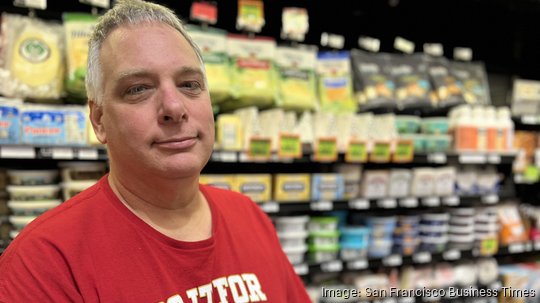
Go-to-market
Climax has developed two versions of its blue cheese — one for food service providers like restaurants and another for grocery retailers — with a base that includes pumpkin seeds, lima beans and hemp protein.
In early July, Climax announced that its blue cheese had launched at two Bay Area markets: online grocery provider Good Eggs and Woodlands Market in Kentfield, a small community in Marin County.
It wasn’t the startup’s first attempt at a retail launch, though.
A sales representative for Climax reached out to Rainbow Grocery nearly a year ago, but the San Francisco market passed when it saw the vegan blue’s ingredients list. It included kokum butter — an ingredient that’s not registered as “generally regarded as safe," or GRAS, in the U.S.
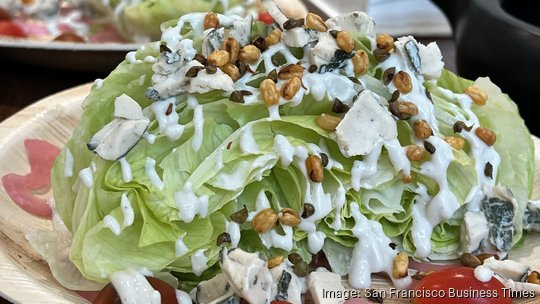
It was “really one of the best vegan cheeses we've tried," Gordon Edgar, Rainbow’s cheese buyer, said. "It was certainly unlike any other vegan blue on the market."
But Rainbow wasn’t going to sell a product with a non-GRAS ingredient.
"I informed them of that and they said they were going to reformulate,” Edgar said.
Edgar has worked at Rainbow for three decades, and has also been a volunteer judge for the Good Food Awards in previous years. He was also the person who reported Climax's non-GRAS ingredient to the contest’s organizers, leading them to eventually reject Climax.
Climax isn’t the first company to have been disqualified from the Good Food Awards after being picked as a finalist or winner, Weiner said, but she disqualified the company after learning it was “using an ingredient that did not meet our stated rules" regarding food safety, complying with government regulations and industry best practices.
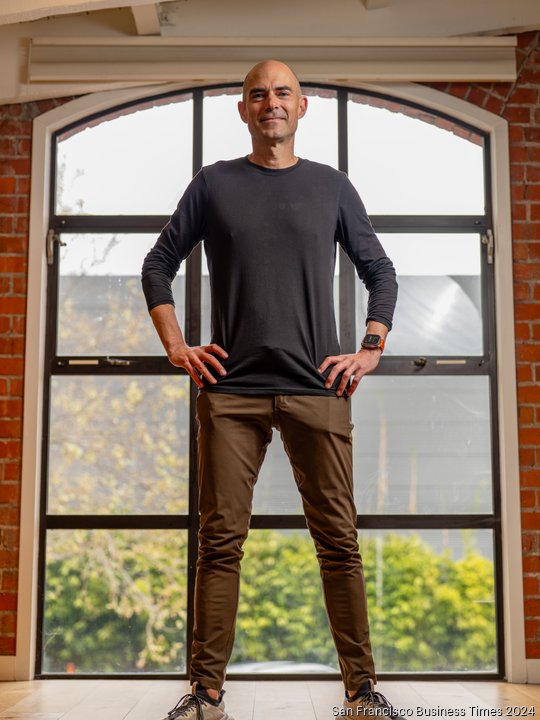
Zahn contends the contest’s organizers could have done more to resolve any issues before the awards ceremony at the end of April.
"The (Good Food Awards) should have tried harder" to get in touch with Climax, Zahn wrote in an email.
There were other issues that arose, as well, Weiner said. Climax’s blue cheese wasn't on retail shelves when it entered the contest, though rules only require that products "be ready for retail sale." And the startup later admitted to submitting a different sample that didn’t match its original submission.
"If that was the case, it also would be disqualifying. What the judges taste and what gets vetted — it needs to be the same product,” Weiner said.
Zahn acknowledged there was a discrepancy regarding the two different versions of its blue cheese and contends the retail version was ready for sale even though it wasn’t on shelves at the time.
“There was no need to sell it because we had not planned in retail as our initial focus was on food service," Zahn said via email.
It was too little, too late for the Good Food Awards. But Climax is pressing on. Its vegan blue is available on the menus of 15 restaurants, chiefly in the Bay Area, Los Angeles and New York City.
And nearly a year later, Edgar is considering bringing the Climax blue to Rainbow’s cheese display to test sales despite a rocky first attempt.
He still has concerns, though.
"The last time I looked at this company, it actually doesn't call itself a food company. It calls itself a technology company," he said. It seemed like Climax wanted “to push ahead and not do the work that other companies do before producing something that people are going to put in their bodies."
Ultimately, consumers will decide if a chunk of vegan blue is worth $46 a pound. But first, Climax must persuade buyers like Edgar that its early missteps were just a glitch.
